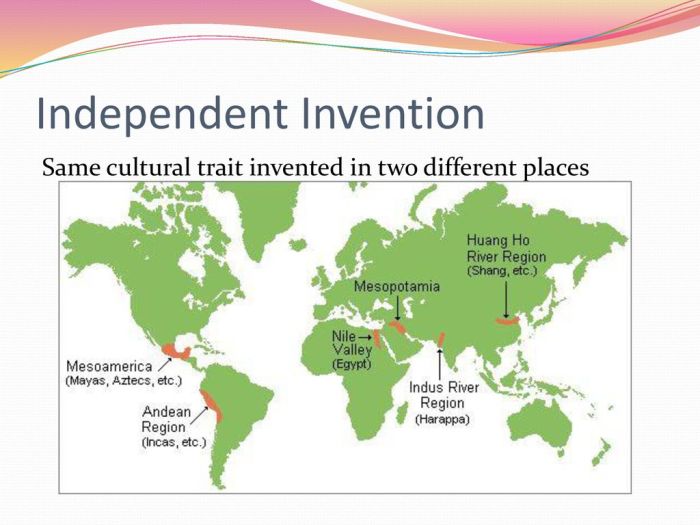Independent invention ap human geography – Independent invention, a captivating concept in human geography, challenges traditional notions of cultural determinism and unveils the intricate interplay between innovation, diffusion, and the environment. This discourse explores the factors influencing independent invention, showcases case studies of its profound impact on societies, and delves into its implications for understanding the diversity of human cultures and the future of human geography.
Independent invention arises when similar technologies or practices emerge independently in different cultural contexts. Factors such as environmental constraints, cultural values, and technological advancements shape the development of these innovations. Case studies, such as the independent invention of agriculture in multiple regions, illustrate the influence of these factors.
Independent Invention

Independent invention refers to the phenomenon where similar inventions or discoveries are made independently by different individuals or groups in different cultural contexts without direct contact or knowledge of each other’s work.
Definitions and Concepts
Independent invention is a key concept in human geography as it challenges the notion of cultural determinism and highlights the role of individual creativity and innovation in shaping human societies.
Examples of independent inventions include the development of agriculture in different parts of the world, the invention of the wheel in multiple civilizations, and the discovery of calculus by Newton and Leibniz.
The spread of independent inventions can be facilitated by diffusion, the process by which ideas and technologies spread from one culture to another through contact and interaction. However, innovation, the process of creating new ideas and technologies, is also essential for independent invention to occur.
Factors Influencing Independent Invention
Environmental factors, such as climate and geography, can influence the development of independent inventions by shaping the challenges and opportunities faced by human societies.
Cultural factors, such as values, beliefs, and social structures, can also influence independent invention by providing the context and motivation for innovation.
Technological factors, such as the availability of resources and knowledge, can further influence independent invention by enabling the development of new ideas and technologies.
Chance and necessity can also play a role in independent invention, with偶然 events or pressing needs sometimes leading to the development of new technologies or practices.
Case Studies of Independent Invention, Independent invention ap human geography
The invention of agriculture in different parts of the world is a classic example of independent invention. In each case, the need for a reliable food source led to the development of farming practices, but the specific crops and techniques used varied depending on the local environment and cultural context.
Another example is the development of the wheel in multiple civilizations. The wheel was independently invented in Mesopotamia, China, and Mesoamerica, with each civilization developing its own unique design based on its specific needs and resources.
Implications for Human Geography
The concept of independent invention challenges traditional notions of cultural determinism, which holds that culture is the primary determinant of human behavior and innovation.
Independent invention highlights the role of individual creativity and innovation in shaping human societies and emphasizes the importance of considering the environmental, cultural, and technological factors that can influence the development of new technologies and practices.
Understanding independent invention is crucial for understanding the diversity of human cultures and societies and for exploring the role of innovation in shaping the future of human geography.
Questions Often Asked: Independent Invention Ap Human Geography
What is independent invention in human geography?
Independent invention refers to the independent emergence of similar technologies or practices in different cultural contexts.
How does independent invention challenge cultural determinism?
Independent invention demonstrates that cultural factors alone do not determine technological development, as similar innovations can arise independently in different cultures.
What factors influence independent invention?
Environmental constraints, cultural values, technological advancements, chance, and necessity all play a role in shaping independent invention.

